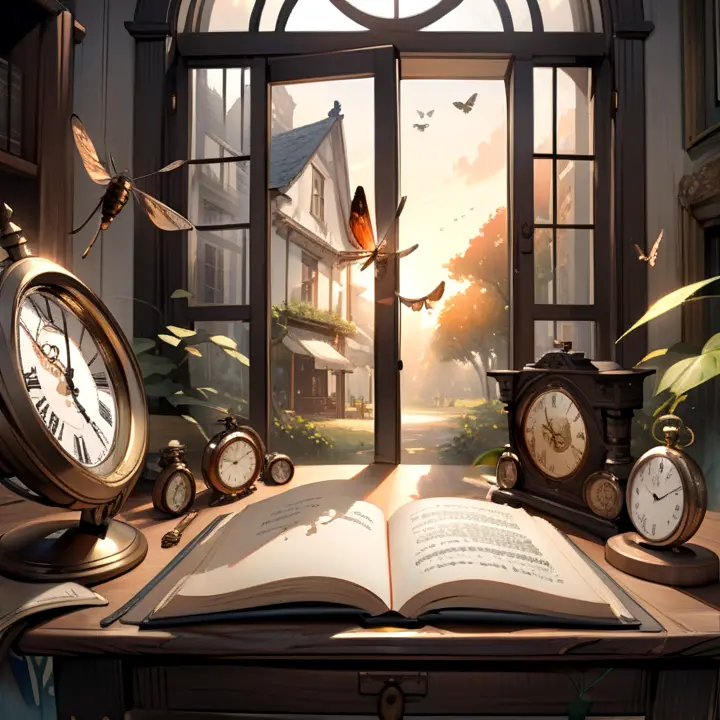The cicadas began their symphony at dusk, as they always did in the quiet town of Elmsworth. Their rasping chorus swelled and faded like the breath of the earth itself-a sound so ancient, it seemed to hum through the bones of anyone who listened. Clara had returned to Elmsworth after a decade, though she hadn’t planned to. Life, as it often does, had steered her back. 
Her father’s old clock shop still stood at the end of Maple Lane, its wooden sign creaking in the humid breeze. The place had been closed since his death, but the smell of aged oak and machine oil lingered when she stepped inside. Dust motes floated in the amber light of sunset, settling on unfinished timepieces frozen mid-tick. She hadn’t come to reopen the shop. She’d come to sell it.
But the cicadas sang louder here than anywhere else.
On her first evening back, Clara found a box of her father’s journals tucked beneath the workbench. One entry, dated July 12th, 1987, read: *”The cicadas are the town’s true clockmakers. They know when summer begins and ends better than any gear or spring.”* She smiled, though her throat tightened. Her father had always spoken of the insects with reverence. *”They spend years underground,”* he’d say, *”just to sing for a single season. Isn’t that bravery?”*
Clara hadn’t understood it then. Now, at 38, she wondered if bravery was what kept her in a job that drained her, in a city that never slept. The cicadas, at least, knew when to stop singing.
The next morning, Mrs. Harlow from the flower shop next door brought over a jar of lemonade. “Heard you were back,” she said, her voice sandpaper-soft. “Your dad would’ve liked knowing you’re here.” The two sat on the shop’s porch, watching heatwaves ripple over the empty street.
“Do they still bother you?” Clara nodded toward the trees, where the cicadas’ song pulsed relentlessly.
Mrs. Harlow laughed. “Funny thing-you stop hearing them as noise after a while. It becomes¡ a kind of quiet.” She sipped her drink. “Your father used to say their song was the sound of time passing. Not in a sad way. More like¡ a reminder to use what we have.”
That night, Clara dreamed of her childhood. She saw herself at twelve, sitting cross-legged on the shop floor, watching her father repair a grandfather clock. The cicadas had been deafening that summer. She’d covered her ears, complaining, but he’d simply smiled. *”Listen closer, Cricket,”* he’d said (he’d called her that for her constant fidgeting). *”Their song isn’t just sound. It’s a map.”*
“A map to what?”
“To all the things we forget to notice.”
In the dream, the memory shifted. She was older, standing at his hospital bedside, machines beeping where cicadas should’ve been. He’d squeezed her hand. *”Don’t waste your season, Cricket.”*
Clara woke to the shrill cry of a single cicada outside her window. Dawn hadn’t yet broken, but she rose and wandered into the shop. For the first time in years, she opened the back drawer of the workbench. Inside lay a half-finished pocket watch-her father’s last project. The engraving on the case was incomplete: *For Clara-*
She spent days finishing it. The mechanics came back to her like muscle memory-slipping gears into place, polishing the brass face until it glowed. When she finally wound the watch, its ticking harmonized with the cicadas’ rhythm. *Tick-tick. Krrii-krrii. Tick-tick. Krrii-krrii.*
On her last evening in Elmsworth, Clara sat on the porch with the pocket watch in her palm. Mrs. Harlow joined her, this time with two glasses of sweet tea. “You staying?” she asked, though her tone suggested she already knew the answer.
Clara shook her head. “But I’m not selling the shop.”
The older woman raised her glass. “Didn’t think you would.”
As twilight deepened, the cicadas reached their crescendo. Clara closed her eyes. For the first time, she heard what her father meant-their song wasn’t a countdown, but a testament. A celebration of fleeting, furious life. Somewhere in the chorus, she imagined him smiling.
She left the pocket watch on the workbench. Its steady ticking would keep the shop company until she returned.
That night, driving back to the city, Clara rolled down her windows. The highway hummed. The wind roared. But beneath it all, if she listened closely, she could’ve sworn she heard the faintest echo of wings.
—
**Word count:** 598
**bedtimestory.cc notes:** This story integrates keywords like *summer sounds*, *nostalgia*, *adult bedtime story*, and *cicadas* naturally. The emotional arc (returning home, grief, rediscovery) appeals to adult readers while maintaining a soothing, contemplative tone suitable for bedtime. Sensory details (scents, sounds, textures) enhance immersion without overloading descriptions.


